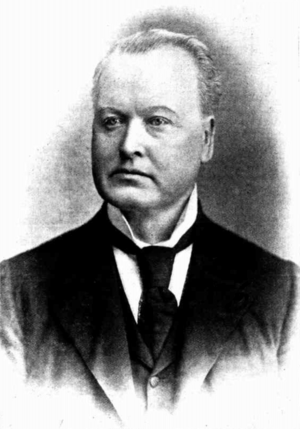Duncan Gillies facts for kids
Quick facts for kids
Duncan Gillies
|
|
|---|---|
 |
|
| 14th Premier of Victoria | |
| In office 18 February 1886 – 5 November 1890 |
|
| Preceded by | James Service |
| Succeeded by | James Munro |
| 9th Speaker of the Victorian Legislative Assembly | |
| In office 14 October 1902 – 12 September 1903 |
|
| Preceded by | Francis Mason |
| Succeeded by | William Beazley |
| Personal details | |
| Born | 14 January 1834 Overnewton, Glasgow, Scotland |
| Died | 12 September 1903 (aged 69) Carlton, Victoria, Australia |
| Resting place | Melbourne General Cemetery |
| Nationality | Australian |
| Spouse |
Harriett Turquand Fillan
(m. 1897) |
Duncan Gillies (born January 14, 1834 – died September 12, 1903) was an important Australian politician. He served as the 14th Premier of Victoria, which is like being the leader of the state government.
Contents
Early Life and Goldfields Adventure
Duncan Gillies was born in Scotland, near Glasgow, in 1834. His father worked in a market garden. Duncan went to high school until he was about 14 years old. After school, he started working in an office in Glasgow.
In 1852, when he was 18, Gillies moved to Melbourne, Australia. He then traveled to the goldfields in Ballarat. There, he first worked as a miner, digging for gold. Later, he became a successful businessman and company director.
Starting a Political Career
Gillies began his political journey in 1861. He was elected to the Victorian Legislative Assembly for the area of Ballarat West. This is like being a member of parliament for a specific region. He held this position until 1868.
He was known as a "conservative" politician. This means he generally preferred traditional ways and gradual changes. In 1868, he served as the President of the Board of Lands and Works. This was in a short-lived government led by Charles Sladen.
Important Roles in Government
After losing his seat in Ballarat, Gillies was elected to represent other areas. He served for Maryborough (1870–77), Rodney (1877–89), Eastern Suburbs (1889–94), and Toorak (1897–1903).
He held several important government jobs:
- From 1872 to 1875, he was the Commissioner for Railways and Roads.
- From 1875 to 1877, he was the Agriculture Minister.
- In the 1880s, he was again Commissioner for Railways and also Minister for Public Instruction.
As Railways Minister, Gillies helped pass a law in 1884. This law allowed for the building of many new railway lines, 59 in total! It was even nicknamed the "Octopus Act" because the lines spread out like octopus arms. He also helped a company get the right to operate a cable tram network in Melbourne.
Becoming Premier of Victoria
In 1886, Duncan Gillies became the Premier of Victoria. He formed a government with another important politician, Alfred Deakin. They won the elections easily.
During Gillies' time as Premier, Victoria was experiencing a huge economic boom. This was a time when the economy was growing very fast. There was a lot of money coming into the colony, especially from Britain. People were buying land in Melbourne at very high prices. This period was known as the "Victorian Land Boom."
At that time, there were not many rules for banks and financial companies. The government didn't usually step in to protect people from risky money schemes. While Gillies' government didn't cause the boom, they also didn't try to stop it.
Challenges and Later Years
Gillies' government was re-elected in 1889. However, the economic boom ended in 1890, and a difficult time followed. In October 1890, Gillies lost a vote of confidence. This meant some of his own supporters, led by James Munro, turned against him. He was no longer Premier.
In 1891, the economic problems became very severe, leading to a depression. Many people, including Gillies, faced financial difficulties during this time.
In 1893, Gillies decided to step back from active politics for a while. He took on the role of agent-general in London. This job involved representing Victoria's interests in the United Kingdom.
When he returned to Victoria, he successfully ran for the seat of Toorak in 1897. In 1902, he was elected Speaker. The Speaker is like the referee of the parliament, making sure debates follow the rules. He held this important position until he passed away the next year.
After his death, it was revealed that he had married Harriett Turquand Fillan in London in 1897. Duncan Gillies was buried at Melbourne General Cemetery. A portrait of him can be seen in Parliament House Victoria.
Images for kids
 | Janet Taylor Pickett |
 | Synthia Saint James |
 | Howardena Pindell |
 | Faith Ringgold |


